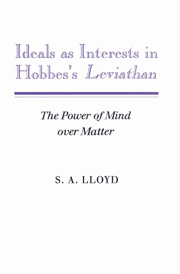Book contents
- Frontmatter
- Contents
- Acknowledgments
- A note on references
- Introduction
- 1 The standard philosophical interpretation
- 2 Hobbes's compositive reconstruction, phase one: identification of the principle of political obligation
- 3 Compositive reconstruction, phase two: religion and the redescription of transcendent interests
- 4 Hobbes's mechanism for the reproduction of social stability
- 5 Hobbes's resolutive analysis, phase two: part 4 of Leviathan
- 6 Theory in practice: Leviathan and Behemoth
- 7 Hobbes's resolutive analysis, phase one: design and detail
- 8 The treatment of transcendent interests
- 9 Hobbes's absolutism
- Notes
- Index
6 - Theory in practice: Leviathan and Behemoth
Published online by Cambridge University Press: 08 January 2010
- Frontmatter
- Contents
- Acknowledgments
- A note on references
- Introduction
- 1 The standard philosophical interpretation
- 2 Hobbes's compositive reconstruction, phase one: identification of the principle of political obligation
- 3 Compositive reconstruction, phase two: religion and the redescription of transcendent interests
- 4 Hobbes's mechanism for the reproduction of social stability
- 5 Hobbes's resolutive analysis, phase two: part 4 of Leviathan
- 6 Theory in practice: Leviathan and Behemoth
- 7 Hobbes's resolutive analysis, phase one: design and detail
- 8 The treatment of transcendent interests
- 9 Hobbes's absolutism
- Notes
- Index
Summary
How we can have peace while this is our religion, I cannot tell …
–Hobbes (B 73)We have thus far constructed, by means of a close textual analysis of Parts 2, 3, and 4 of Leviathan, an interpretation of Hobbes's political philosophy quite markedly different from the widely received standard philosophical interpretation. Our interpretation takes Hobbes to be addressing the problem of order posed by diversity of judgment; in particular, the problem of order that arises when factions within a society affirm and act upon competing judgments about, or conceptions of, their transcendent interests, especially religious interests. What we have argued to be Hobbes's solution to the problem of order so conceived, is to redescribe competing transcendent interests in such a way that they become both mutually reconcilable, and corroborative of the affirmation of a principle of political obligation argued to be maximally effective in ensuring the perpetual maintenance of peaceful social order. (And, of course, to demonstrate that adherence to this principle is instrumentally linked to the satisfaction of people's various other interests as well.) Both the principle and the redescription of transcendent interests are then to be reinforced, and allegiance to them to be reproduced, by means of an aggressive system of education. The strategy Hobbes employs in developing this solution is to provide enough people, at any given time, with sufficient reason to adhere to his principle of political obligation, that peaceful social order may be maintained perpetually.
- Type
- Chapter
- Information
- Ideals as Interests in Hobbes's LeviathanThe Power of Mind over Matter, pp. 189 - 233Publisher: Cambridge University PressPrint publication year: 1992



